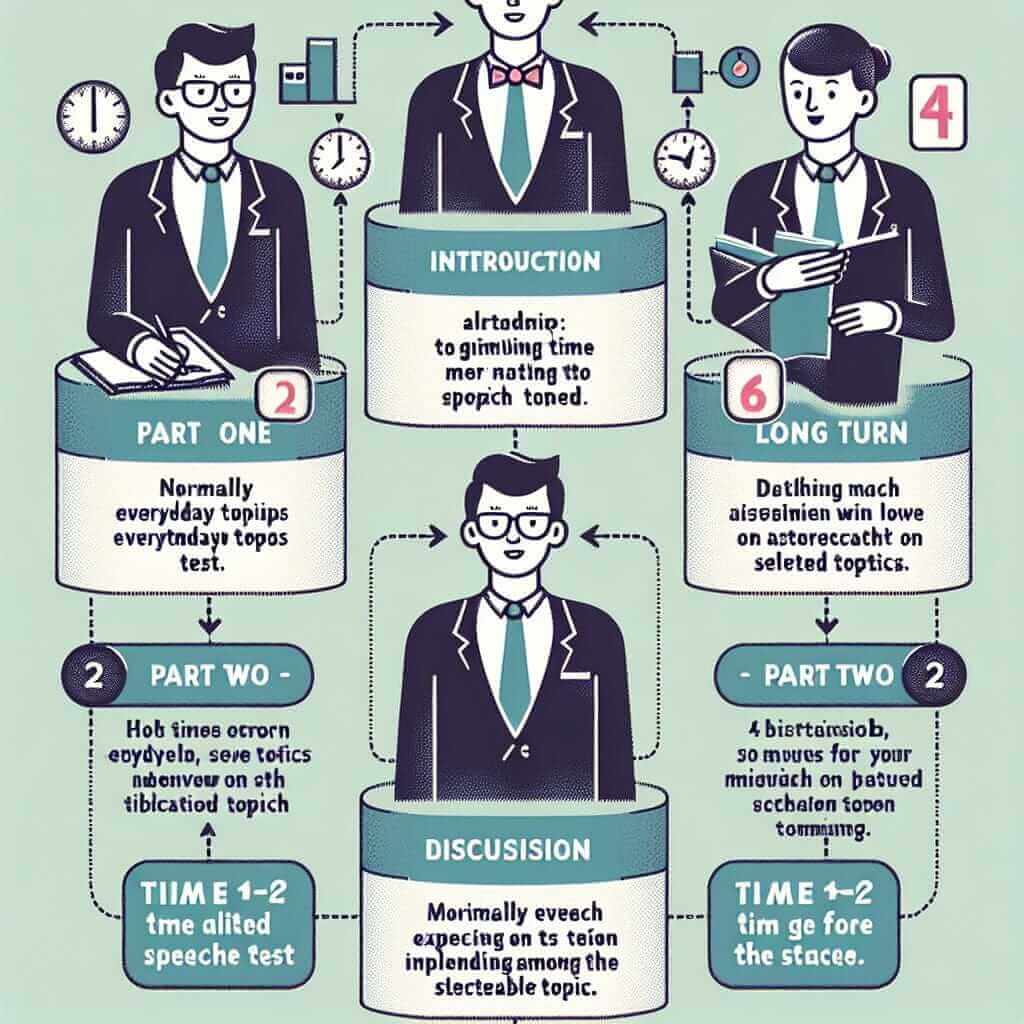Acing the IELTS Speaking test can feel like a daunting task, but with the right strategy, you can confidently express yourself and achieve your desired score. There’s no magic formula, but understanding the test format, key skills assessed, and effective preparation techniques will undoubtedly enhance your performance.
Understanding the IELTS Speaking Test
The IELTS Speaking test is a one-on-one interview with a certified examiner, lasting 11-14 minutes. It is divided into three parts:
Part 1: Introduction & Interview (4-5 minutes)
This part focuses on familiar topics like hobbies, work, or studies. You’ll answer general questions about yourself and your experiences.
Part 2: Individual Long Turn (3-4 minutes)
Here, you’ll receive a cue card with a specific topic and prompts. You’ll have one minute to prepare and then speak for 1-2 minutes on the topic.
Part 3: Two-way Discussion (4-5 minutes)
Building upon Part 2, this section involves a deeper discussion with the examiner on abstract concepts related to the previous topic.
Key Skills Assessed
The IELTS Speaking test evaluates your ability to:
- Communicate opinions and information on familiar topics.
- Speak at length on a given topic, using appropriate language and structure.
- Express and justify your viewpoints clearly.
- Engage in a conversation and discuss abstract ideas.
Crafting Your Winning IELTS Speaking Strategy
While every test-taker is different, some universal strategies can significantly improve your performance:
1. Fluency and Coherence
What it means: Speaking smoothly and logically, connecting your ideas seamlessly.
How to achieve it:
- Practice regularly: Speak English as often as possible, even if it’s just to yourself.
- Record yourself: Identify areas for improvement in pace, pauses, and clarity.
- Use discourse markers: Words like “furthermore,” “however,” and “in addition” help connect your ideas.
Example:
Instead of saying: “I like to read. I read every day. I like novels.”
Say: “I’m an avid reader. In fact, I make it a habit to read every single day, and my favorite genre has to be novels.”
2. Lexical Resource
What it means: Using a wide range of vocabulary accurately and appropriately.
How to achieve it:
- Expand your vocabulary: Learn synonyms, idioms, and phrasal verbs related to common IELTS topics.
- Paraphrase: Show the examiner you can express ideas in different ways.
- Avoid repetition: Using the same words repeatedly can lower your score.
Example:
Instead of saying: “I was very happy when I got my exam results.”
Say: “I was absolutely thrilled to receive my exam results. It was a moment of pure joy and elation.”
3. Grammatical Range and Accuracy
What it means: Using a variety of grammatical structures correctly.
How to achieve it:
- Master basic grammar rules: Ensure you have a strong foundation in English grammar.
- Practice complex sentences: Combine simple sentences using conjunctions and relative clauses.
- Pay attention to tenses: Use the correct tense for past, present, and future events.
Example:
Instead of saying: “I go to the cinema yesterday.”
Say: “I went to the cinema yesterday.”
4. Pronunciation
What it means: Speaking clearly and understandably, with correct stress and intonation.
How to achieve it:
- Listen to native speakers: Pay attention to their pronunciation and intonation patterns.
- Practice speaking aloud: Focus on clear articulation and word stress.
- Record and analyze your pronunciation: Identify areas that need improvement.
Example:
Practice the difference in stress and intonation between: “I object to that statement” and “I bought a new object.”

Putting Your Strategy into Practice: Sample IELTS Speaking Questions
Part 1:
- What do you like to do in your free time?
- Do you prefer to eat at home or in restaurants?
Part 2:
Describe a time you had to overcome a challenge.
Part 3:
- What are the benefits of facing challenges?
- Do you think people who overcome difficulties are more successful in life?
Avoiding Common Mistakes
- Don’t memorize answers: Examiners can easily spot memorized responses. Speak naturally and spontaneously.
- Don’t use overly informal language: Maintain a polite and respectful tone throughout the test.
- Don’t worry about being perfect: It’s okay to make minor mistakes. Focus on communicating effectively.
Practice Makes Perfect
The key to success in the IELTS Speaking test is consistent practice. Utilize online resources, language exchange partners, and mock tests to build your confidence and refine your skills. Remember, the more you practice, the more comfortable and fluent you will become.